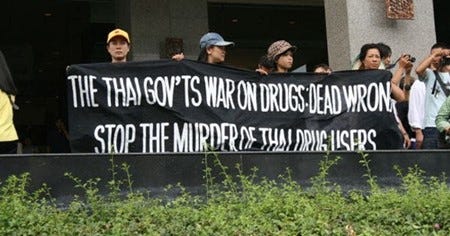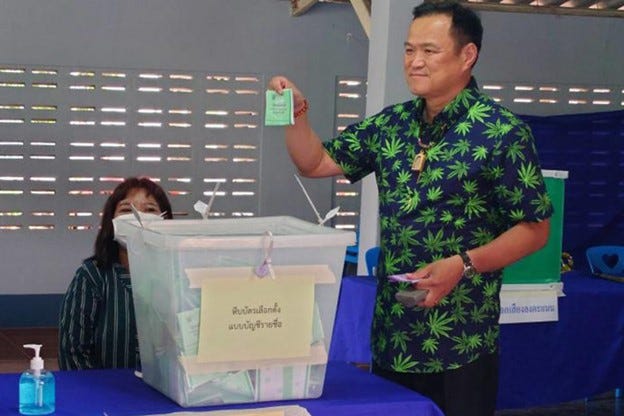What’s in Store for Thai Cannabis in 2024?
Can Cannabis in Thailand Legal, Convenient & Reliable with a Prime Minister who equates the plant with hard drugs?
The Odd Couple of Southeast Asia: Anutin and Srettha
Photo via Facebook/ Anutin Charnvirakul and Srettha Thavisin
The new Deputy Prime Minister delisted cannabis as a narcotic and gave birth to a booming cannabis market, introduced the Mr. Ganja mascot and voted in a shirt with a thousand cannabis leaves.
The new Prime Minister despises weed.
He promises to relist the as a dangerous narcotic. He drums into the heads of his constituents that cannabis degrades society and “corrupts the young”.
Srettha and Anutin will hold the top positions in the Thai Parliament, making them the cannabis “odd couple” of Southeast Asia.
The guy who believes cannabis is a destroyer of society is moving in with the boss of the party that led the movement for cannabis decriminalization.
Anutin’s new roommate, the Prime Minister, represents a party that led a brutal drug war in the early 2000s. It is beyond dispute that during this time, cannabis users were sentenced to decades in prison, expats and tourists caught possessing cannabis were bribed, imprisoned and blackballed, while those accused of selling cannabis were hunted and killed without trials.
Thaksin's Morphing Views on Cannabis Manifest in Daughter’s Acceptance of Medical Cannabis
Thaksin and his politically ambitious daughter.
Thaksin's stance on cannabis underwent a half-hearted metamorphosis. Initially aligned with international conventions on drug control, he championed a stringent clampdown and criminalization of cannabis.
Yet, as global sentiment around cannabis pivoted, Thaksin exhibited inklings of receptiveness toward novel avenues.
In 2003, Thaksin's administration flirted with the notion of legalizing cannabis for medical purposes. His office pondered remedies for afflictions carried by patients ensnared in specific maladies. However, staunch opposition thwarted this proposition, rendering it a stillborn initiative.
Pheu Thai Wants To Legalize Medical Cannabis? Best To Keep an Eye On That
Promoting medical cannabis while illegalizing recreational could be a plan to drive the sector to an economic dead-end while keeping it hanging from a string that can be snipped with the snap of a finger.
The question that Mr. Anutin should press with his new coalition partner is this: Does it make sense to praise medical uses of cannabis if the same plant represents an existential threat to society?
Surely, this was the pushback that Thaksin experienced in the early 2000s after he showed the slightest interest in medical cannabis.
In other words, how successful can the medical cannabis sector be if its advocates say it has the potential to corrupt the young and destroy the fabric of society?
10 years ago, a story in the Bangkok Post, Thaksin's 'War on Drugs’ a Crime Against Humanity, gave a glimpse of the violence at the center of Thaksin’s Thai drug war:
Thaksin’s "war on drugs" saw 2,873 Thais dead in a matter of three months, from February to May, 2003.
Victims included whole families, women, children and olds. In many cases, bodies were left out in the open in an almost ritualistic public display, to be photographed by local press.
An investigative report by the UK's Sunday Times, in 2008, said: "Police and local authorities drew up so-called blacklists of drug suspects which were submitted to the Ministry of Interior."
The Times obtained an official letter sent by the ministry to provincial governors, explaining the three ways to remove names from the lists: "Arrest, extrajudicial killing or loss of life [death for various reasons]. Drug dealers are traitors to the nation. We have to get rid of them. Don't give them mercy."
Saying you are pro-medical cannabis can give cover for anti-cannabis intentions. In some cases, a pro-medical cannabis position is more about being against fresh dried cannabis flower. It can also be a not-so-secret signal that you intend to prohibit possessing weed by implying dried cannabis flower and “recreational use” are equivalent.
Suppose I want to make cannabis vanish where evidence of its benefits is coming to light. In that case, I might say I love medical use and then set about making the boundaries of such use smaller and smaller until it’s as if there is a ghost town where a bustling metropolis once was.
Not Long Ago, The Singapore model and the Thai model were one
Thaksin Dehumanized All “Drug Users”
In his mind and in his rhetoric, there was no Distinction Between Cannabis and Other Drugs.
Thaksin's utterances on drug users held a brutal and degrading cadence, drawing a mix of disapproval and endorsement.
He referred to people as "vermin" and "scum of the earth" to delineate those entangled in drug-related pursuits. This lexicon of fear-mongering and vilification not only bolstered stigma but also molded law enforcement maneuvers and the populace's perception of drug users as a filthy class that included cannabis users.
How It Started/ How It’s Going
Thaksin Shinawatra on Thailand’s war on drugs
Below are 4 quotes from Thaksin Shinawatra and his cabinet members during his time as Prime Minister from 2001 to 2006:
Thaksin Shinawatra (2001): "Drug dealers are worse than subversives; they don't have rights."
Thammarak Isarangura Na Ayuthaya, Deputy Prime Minister (2001): "We must be more brutal in enforcing the law against drug traffickers, even if it means killing them."
Chidchai Vanasatidya, Minister of Justice (2002): "We have a policy to severely punish drug dealers. Our justice system is committed to fighting drugs."
Thaksin Shinawatra (2003): "I want to emphasize that we have not legalized marijuana. But we are considering allowing its medical use for certain diseases."
The punitive measures doled out for cannabis possession during his tenure grew emblematic of his administration's tenacity. Extreme penal harshness raised an alarm over human rights violations and the erosion of civil liberties.
Critics contend that Thaksin's dehumanizing orations fanned the flames of violence and discrimination against drug users, eclipsing a more compassionate and comprehensive approach to combating drug dependency as a public health concern and embracing cannabis as a path to wellness and balance.
Thaksin Shinawatra’s Daughter on Pheu Thai’s drug policy for 2024
Over the past several months, Thaksin’s daughter and her colleagues in the Pheu Thjai party have been tasked with stirring up slumbering stigmas, castigating legal cannabis retailers and catastrophizing its decriminalization. It can be disorienting to someone unfamiliar with Thai politics, that a progressive, pro-poor anti-business party like Phue Thai is the most vehement voice against liberalizing cannabis laws.
Below are 4 quotes from Thaksin Shinawatra’s daughter and other leaders of the Phue Thai party during the 2023 campaign.
Thaksin Shinawatra’s Daughter (2023): "Pheu Thai will transform this northeastern province by ridding it of all kinds of illegal drugs."
Pheu Thai Secretary-General (2023): “We don’t want any more weed. We’re done with it.”
Thaksin Shinawatra’s Daughter (2023): “Pheu Thai is for medicinal marijuana, not recreational. Do you remember brothers and sisters, the party which sold you Ganja as a magic pill to cure every illness and a cash crop for whoever grows it to become rich? The only people who got rich from it are the capitalists.”
Thaksin Shinawatra’s Daughter (2023): "As a mother, I do not want my children to grow up in a country where narcotics run rampant and cannabis is easily available."
Taken together, these remarks look like a strategy to conflate cannabis with hard drugs and rekindle old stigmas based on ignorance and misunderstanding.
By contrast, an article pushed by Anutin’s team has him asserting that:
…he doesn't see any disadvantages in the current medical cannabis policy aside from the improper use of the drug by some members of the public.
As Deputy Prime Minister he also made the following assertions:
"The best thing we can do is have a law to control cannabis use,"
“The policy of cannabis for medical treatments" will not be terminated by the new government, adding the leader of the ruling Pheu Thai Party has publicly announced that the policy is still included on the new government’s list.”
The Rubber Band Policy: An Expansive Medical Cannabis Legalization Regime
Medical Cannabis Can Only Expand.
The scope of authentic medical cannabis never shrinks, it only enlarges or stays the same. Throughout their campaign through May, the Pheu Thai Party said it would make cannabis very difficult to obtain and promised new sanctions for growers and retailers who are outside of the small band of providers for hospitals and hospital-adjacent clinics.
If history is any guide here, it would be prudent to take Pheu Thai at its word.
Throughout the campaign, Sretta’s Pheu Thai party stoked cannabis stigmas and warned voters that the economic benefits of cannabis would never reach them. Cannabis profits will only flow to the wealthy, they warned their rural followers.
Meanwhile, health minister Anutin was using the levers at his disposal to delist cannabis as a narcotic before regulations were ratified, to kick-start the Thai cannabis marketplace. Anutin never wavered in his reassurances to farmers that cultivating cannabis would increase the quality of their lives with additional income opportunities.
The Thai Cannabis Compromise
We have had a year to test in the real world the fears and catastrophes predicted by the anti-cannabis movement, and we can see that the only catastrophe to fear was the collapse of the most promising cannabis industry in the world -- under the weight of demagogues stoking fear and uninformed rural farmers turning against cannabis.
The friends of cannabis in Thailand ought to take care not to encourage the stigmatized masses to align with the regulators -- a group with no incentive to consider consumer outcomes.
The regulator’s job is to obsess over every detail of this patch of the work-a-day world -- no matter how minuscule -- that could be harmful.
Without pro-cannabis leadership, it is difficult to imagine a realistic scenario where the Cannabis Act presents itself as a consumer-friendly bill of rights, rather than a list of new-fangled prohibitions against a drug that threatens “to destroy Thai society”.
8 Proposals for Thai Medical Cannabis
By focusing on expansive medical cannabis, implementing testing and safety measures, and fostering an open market, Thailand can establish itself as a progressive leader in the emerging cannabis industry and return to the path of being the premiere cannabis hub in Asia.
1. Complete Overdue Cannabis Act: Establish a committee responsible for drafting the long-awaited Cannabis Act, addressing key issues surrounding legalization, regulation and licensing. List key rights of law-abiding citizens in the cannabis industry, both producers and consumers.
2. Promote “Expansive Thai Medical Cannabis”: Prioritize public/private educational partnerships to develop and promote the idea of Expansive Thai Medical Cannabis – defining medicine as an elastic concept tied to wellness, with great variability between individuals.
Safety. Announce that the sale of cannabis products to minors is the red line of medical cannabis. Enact new penalties for selling cannabis to minors, including license revocation and jail for retailers who allow minors to make purchases in their clinics.
Education and Branding. In keeping with the mandate to educate, public signage that reinforces old stereotypes of anti-social cannabis consumption ought to be redesigned. Every licensed business must include “Clinic” in its signage. Terminate the use of “Dispensary”.
· Encourage retailers to promote a new mindset -- where cannabis and medicine begin to go together in consumers’ minds. Such proactive branding will go a long way to mollifying community members who are aghast at some bolder Thai weed signage.)
· Encourage creators to ideate about the benefits of cannabis as a medicine and a plant that brings wellness to a healthy life.
· Encourage consumers to use cannabis when engaging in physical training or strenuous activity. Discourage any stereotypes in the promotion of the conscious cannabis user.
· Encourage educational projects through The Health Department and provide forums for the industry to showcase its most effective educational ideas. Adopt a total-quality-management approach that is continuously improving its educational content and platforms for consumers.
Bottom line: All Thai cannabis fit for human consumption is assumed to be medicine. Anyone above 20 and not pregnant who identifies a health issue that cannabis treats can obtain a medical cannabis card.
3. Crack Down on Online Cannabis Sales: Unlicensed and unregulated online cannabis sales are the number one danger to both legal cannabis users and illegal, underage users. These enterprises are unaccountable for their product quality and may have no brick-and-mortar address -- creating unacceptable possibilities for harm. Consumers do not truly know where the products come from or who sent them. These online sellers are digital outlaws, beyond any regulations, vetting, or licensing.
On the other hand, delivery services that track cannabis products from a licensed clinic to a verified legal consumer should be available to every legal cannabis user.
4. Mandate Testing with Certificates of Analysis: The Cannabis Act must require licensed cannabis retailers to conduct basic testing on their products and provide Certificates of Analysis (COAs). These COAs will ensure consumer safety in many ways, like verifying the absence of toxic mold or bacteria.
5. Implement Testing Discipline and Classification: Develop a comprehensive testing regimen to generate useful data for the industry. A simple mandate could be a requirement for all dried flower strains to have a COA before being offered to the public.
Make international standards analysis available to exporters and promote the service – preferably a private enterprise that partners with the Health Ministry for this purpose.
Mandate that all packaging of cannabis consumables include a warning saying: “Medicine For Adults 20 & Over. Do not consume if you think you might be psychotic. Do not abuse. Do not be a burnout.”
6. Medical Cannabis Card: Introduce a government-issued ID card for individuals qualifying for medical cannabis use. Ask about current meds and a history of psychosis. Check ID. Keep the bar to qualification low and the fee small, lest you create a black market for the cards. 3 prices, 3 choices. A fee for 1, 3 or 5 years. Provide cards wherever cannabis products are sold.
Encourage clinics to provide delivery services directly from their retail spaces. Anyone who can show a valid Card ought to be able to have cannabis delivered from his/her local licensed clinic of choice. Allow jurisdictions to vote to opt out of the medical card mandate.
7. Introduce a Tax Regime That Follows Taxation For Other Herbal Medicines: Allocate funding to foster Global Supply Chain Partnerships: Spell out best practices for cannabis exports and encourage international relations. Keep taxes and fees low. Embrace the reality that imports will subvert some Thai supply chains. Low taxation will increase the sector’s competitiveness in any case.
8. Decentralized Zoning Regulations: Allow local jurisdictions to determine their zoning regulations for cannabis businesses, ensuring a balanced relationship between the marketplace and the community. This approach avoids a one-size-fits-all regulation that restricts the market's potential.
These zoning mandates are already in place for temples and schools. Permit entire areas to opt out of cannabis stores in their community. This approach avoids a one-size-fits-all regulation that creates problems with the desires and preferences of particular communities.
The High Velocity Growth of Thai Cannabis Culture
Thailand removed cannabis flower from its narcotics list in June 2022, leading to the rise of the cannabis industry. Since then, around 12,000 cannabis stores have opened across Thailand. Without dried flower, they would all be bankrupt.
Over a million people have registered to grow weed, have come in record numbers to consume it. The industry had annual revenues of $800m by the end of 2022—and is forecast to grow 12-fold by 2030.
Thailand’s first high season with weed ran from December 2022 to April 2023. It is safe to say that the $800m figure is a fraction of what the industry has taken in.
The beginning of September 2023 is prep time for the growing numbers of joint ventures between growers and retailers; Thai cannabis and hemp providers looking to prep for a second high season with an open market for the full spectrum of cannabis products; Multi-million dollar indoor grows of high-grade medical dried flower trying to time their first harvests to be ready by mid-November.
Outdoor grows have increased their yield forecasts and changed their cultivars to improve quality.
A new network of cannabis-friendly resorts and cannabis-based retreats, with the first highly publicized event occurring at the end of September. These resorts of the future come together to chomp at bits, waiting for the Cannabis and Hemp Act. The strides that research has made in targeting health problems like anxiety, pain, insomnia, and inflammation with isolated cannabis compounds – cannabinoids -- are manifest in the new seriousness of the Thai CBD sector.
Professionals have been collecting/analyzing data to understand trends in Thai cannabis and are offering new mobile apps to provide track and trace technology; surely, such technology will be required soon.
The policy of Thai cannabis ought to provide a way to hold the course. To act as a magic rubber band that stretches across the political economics of Thai cannabis, the fear associated with the plant, the new industry and all its sectors, and all cannabis consumers and cannabis-curious adults.
The rubber band is, after all, another, far less controversial product made of biomass that Thailand has successfully monetized. Thai Cannabis needs a good rubber band -- a loop of stretchy rubber for holding things together. The simple genius of the rubber band: It can be stretched to its limits, but always manages to bounce back into shape.
What Makes A Conscious Cannabis Consumer/ Provider?
1. Working Knowledge of Why Cannabis Should be Legalized
2. Ability to Explain How Cannabis Uplifts Well-Being
3. The Botany Basics of How Cannabis Compounds Transfer To the Human Mind and Body
The Best Way to Defend Against Turning Back The Cannabis Clock in Thailand: Conscious Cannabis Use. Stay Sharp and Beware of The Medical Cannabis Hustle. Who argues for the health benefits of booze and cigarettes? Where is the scientific literature and ecosystem of researchers, medical practitioners, manufacturers and consumers who are discovering positive health outcomes of booze and cigarette use?
There are no passionate testimonials about how booze and cigarettes changed someone’s life for the better, gave them a reliable exit from opioid addiction, or motivated them to fight for chain smoking and hitting the bottle every day.
Nevertheless, Thai politicians have been insisting for months that Thailand resurrect legal punishments for violating the prohibition on recreational cannabis, whatever that might mean.
One way to come to grips with this apparent contradiction is to understand that behind the digitized Phue Thai drama sits a billionaire and his family.
Perhaps the real problem the Pheu Thai party has with cannabis in Thailand is not so much the cannabis but rather the velocity at which this nascent market has developed since it was decriminalized on June 9th, 2022.
Thailand, May 14th, 2023
How It’s Going:
Staying On The Path to Legal Thai Cannabis
Originally, the intention behind the Cannabis and Hemp Act was to help propel the new industry into maturity with minimal hazards and controversy. Today those intentions are no longer clear, as demagogues, gossips, haters and lazy journalists replace the positive messaging on cannabis coming from Mr. Anutin and his party with a drumbeat of alleged chaos, degradation and psychotic episodes.
Right now, it seems like every politician other than Anutin is against cannabis. They all speak in unison, which itself is unsettling. They say, “no, we are not against medical cannabis, only recreational cannabis.”
There is no elaboration on record as to what they have in mind, beyond making cannabis less accessible and increasing punishments for using it in a non-approved way.







